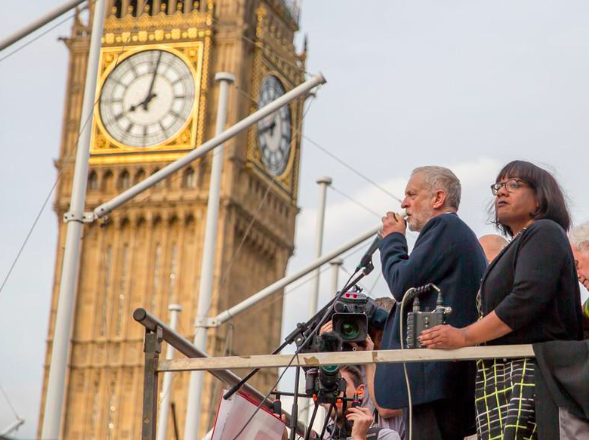People have a inalienable right to a decent home, a good healthcare system, education, and social security. Labour need to start stating this.

Corbyn is the first leader of the Labour Party to talk explicitly about social rights. And increasingly, the UK’s national human rights institutions are using explicit social rights language. This might be how we realise a new progressive politics.
Early this year Jeremy Corbyn said “defending the NHS is defending a basic human value, a basic human right.” In his speech to Annual Conference he emphasised “a decent home is a right for everyone whatever their income or background.”
In remarks to the Labour East Regional Conference he insisted “education is a right, not a privilege”. He has pledged that under Labour “social and employment rights” will be “at the centre of the Brexit negotiations”.
Social rights include the rights to a decent home, an equitable health and care system, education for all, an adequate standard of living, and social security based on respect.
In September, the Centre for Welfare Reform published Social Rights are Human Rights – but the UK System is Rigged, with a Foreword by Paul Mason.
In this report, I explain that the UK has accepted legally binding international obligations to realise social rights and how these human rights could be used to reinforce, deepen and safeguard the impressive social policies in the Labour Party’s manifesto, For the Many not the Few.
Social rights are beginning to gain traction in the UK.
Unite Community, a remarkable new initiative whereby those who are not in work may join Unite, has launched a campaign called ‘A home is a human right’.
People living in Leith are using the right to decent housing to galvanise their community and secure real improvements to their homes.
In Belfast, the non-governmental organisation, Participation and the Practice of Rights, is successfully using the right to social security to challenge punitive sanctions.
Increasingly, the UK’s national human rights institutions are using explicit social rights language.
Social rights recur in the Fabian Society’s recent collection of human rights essays. In her contribution, Lisa Nandy underscores “such basic human rights as safe, clean, and affordable housing”.
A growing social rights literature addresses economics, housing, health, education, social work and many other issues. Polls and studies confirm widespread public support for the idea of social rights.
Although the Labour Party has become the party of human rights and equality, For the Many not the Few does not mention explicit social rights, except for one reference to the right to education.
Stuart Weir describes this omission as “a gaping hole” in Labour’s policies. How can this be put right?
The Institute of Employment Rights (IER) has published A Manifesto for Labour Law: towards a comprehensive revision of workers’ rights. This report shaped the 20-point plan for workers’ rights in For the Many not the Few.
Although they are not the same, workers’ and social rights are closely connected.
Drawing from international labour law, IER envisages a new Ministry of Labour; institutional arrangements to give workers a voice; mechanisms for the enforcement of workers’ rights, such as a Labour Inspectorate and Labour Courts; and carefully formulated workers’ rights.
If this compelling combination of standards, processes and institutions is good for workers’ rights, why not also use it for social rights?
Applied to social rights, this model would build upon reformed social Ministries, national human rights institutions, the Care Quality Commission and similar bodies.
Drawing from international social rights law, it would give attention to national standards for the rights to housing, education, social care and so on.
It would consider institutional arrangements to ensure the meaningful participation of rights-holders (e.g. community members and ‘service-users’) and duty-bearers (e.g. providers and suppliers) in the housing, education, social care and other sectors. It would also consider the place of law in the realisation of social rights.
In this way, A Manifesto for Social Rights could take shape and enrich the Labour Party’s next electoral programme.
Paul Hunt is a professor in human rights at the University of Essex
To reach hundreds of thousands of new readers and to make the biggest impact we can in the next general election, we need to grow our donor base substantially.
That's why in 2024, we are seeking to generate 150 additional regular donors to support Left Foot Forward's work.
We still need another 124 people to donate to hit the target. You can help. Donate today.




One Response to “To be a truly progressive party Labour need a Manifesto for Social Rights”
Dave Roberts
I don’t think anyone is against the main thrust of your argument but what’s Diane Abbott the racist hypocrite got to do with it?